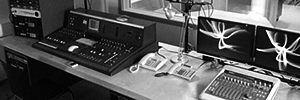
Singer researches how natural brains work. This raises the question of whether computer systems work according to the same principles and what we can learn from this comparison for the development of artificial intelligent systems (AI). Deep neural networks (DNNs) and large language models (LLMs) serve as examples: DNNs are artificial neural networks with many layers that fulfil complex tasks. Examples include image recognition or solving combinatorial problems such as playing chess or Go. LLMs such as ChatGPT are a special form of such networks that have been trained to ‘understand’ language and draw conclusions based on huge amounts of text.
Singer's research suggests that artificial and natural systems use fundamentally different principles to perform their tasks. Artificial systems work with digital signals and process information serially in strictly hierarchical architectures. Natural systems use analogue signals that are processed in parallel in strongly networked architectures with a flat hierarchy. The most important difference is that artificial systems are not dynamic, whereas natural systems exhibit highly dynamic behaviour. This includes rhythmic oscillations of activity, so-called oscillations, which can overlap and synchronise or form complex interference patterns as wandering waves of activity. From simulation studies based on neurobiological findings, Singer concludes that these complex dynamics form the basis of an extremely efficient computing strategy that is similar in some respects to that used in quantum computers.
In the long term, such findings could enable new, energy-efficient AI systems that are more closely aligned with the way the brain works. Singer's interdisciplinary approach combines neuroscience and computer science and invites us to look at cognition and artificial intelligence from a new perspective.
The lecture is open to the public.
Oscillations, waves and interference. The lingua franca of the cerebral cortex. On the essential role of dynamics in the difference between brains and computers.
"Sonic Talk" by Wolf Singer (Ernst Strüngmann Institute (ESI) for Neuroscience, Frankfurt)
Time: Tuesday, 27. May 2025, 7 pm
Location: Main Building of the Bauhaus-Universität Weimar, Oberlichtsaal, Geschwister-Scholl-Straße 8, 99423 Weimar
‘Sonic Talks’ is a new series of events organised by the chairs of ‘Experimental Radio’ and ‘Acoustic Ecologies and Sound Studies’ at the Bauhaus-Universität Weimar. They tie in with the topics of the semester. In the 2025 summer semester, the ‘Sonic Talks’ will focus on rhythm, sound and healing.
About Wolf Singer: Wolf Singer is a world-renowned German neuroscientist whose work has significantly shaped our understanding of the brain, especially its information processing. After studying medicine in Munich and Paris, Singer conducted research in the field of neurophysiology. In 1981, he was appointed Director at the Max Planck Institute for Brain Research in Frankfurt am Main. In 2004, Singer founded the Frankfurt Institute for Advanced Studies (FIAS), which deals with the theoretical treatment of neurobiological questions, among other things. In 2008, Singer founded the Ernst Strüngmann Institute (ESI) for Neuroscience in cooperation with the Max Planck Society, which is dedicated to research into higher brain functions. He has been an emeritus professor since 2011 and continues to head a working group as a senior fellow at the ESI. One of his most influential research contributions is the theory of temporal binding, which states that synchronised neuronal oscillations enable different parts of the brain to process spatially and temporally separated content into coherent perceptions. The brain utilises not only the spatial but also the temporal dimension for its calculations. Singer's work forms a bridge between computer science and neuroscience. It questions the classical notion of linear information processing. The discussion will show whether this results in references to certain concepts in art.
If you have any questions, please contact Romy Weinhold, Press and Public Relations Officer at the Faculty of Art and Design, by telephone on +49 / 36 43 / 58 11 86 or by email at romy.weinhold@uni-weimar.de.



